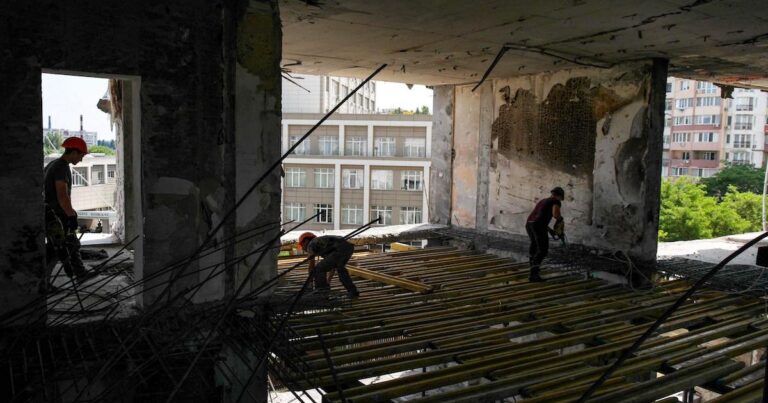
High-ranking Ukrainian and western officials are meeting in Switzerland this week to discuss the country’s reconstruction. The Ukraine Recovery Conference in Lugano aims to bring together government and business to discuss investment and the necessary reforms to support it.
Russia’s war against Ukraine has not only left thousands dead and displaced – it’s also presented an extreme challenge to Ukraine’s economic well-being. And it is workers who are shouldering the cost.
While Ukrainian employers are dealing with the destruction of property and infrastructure, more than 80% of workplace deaths have been caused by the Russian military since 24 February. One person dies at work in Ukraine every day – including railway workers, medical staff and other public sector workers – according to official data.
Ukraine is expected to lose an estimated 50% of its GDP this year due to the Russian invasion. Hundreds of companies have been destroyed, and as a result, 30% of jobs have been lost. According to the Financial Times, by the end of the year the unemployment rate in Ukraine will be at 25% – a record in Europe.
So far, Ukrainian employers have been given a free hand to deal with the challenges of the Russian invasion. State agencies have loosened their oversight of the labour market. And reformers in the parliament and government have sought to push through radical labour reforms that would strip Ukrainian workers of their rights.
But as millions of people try to figure out how to survive Ukraine’s economic downturn, there’s another question that looms on the horizon: what will happen when the war ends?
The future balance of economic power and prosperity in the country is likely to be determined by the changes being wrought in Ukraine now.
The coming demographic change
Russia’s war has predictably reduced labour costs in Ukraine. In May, wages fell by an average of 10% compared to the pre-war period. Advertised wages for jobs in areas such as raw material extraction, security and manual labour have almost halved.
There is a growing perception that the negative effects of the labour market crisis are being felt more by workers than by employers. Ukrainians were ready to endure any difficulties in the immediate aftermath of the Russian invasion. But as the tide of the war has changed, not everyone thinks the current situation – where business has advantages over workers – is fair.
This advantage has been expressed in the Ukrainian parliament’s decision to revoke considerable parts of Ukraine’s labour legislation for Ukrainian employers. Most importantly, employers are able to suspend employment contracts: in these cases, employees do not receive wages, but are still considered employed. Thousands of employees of private companies have remained effectively unemployed for months even without an official reason because of lack of enforcement. As of 1 April 2022, roughly five million citizens applied for one-time income loss benefits – but as of the end of May, the registered number of unemployed people was 308,000, which is 16 times lower.